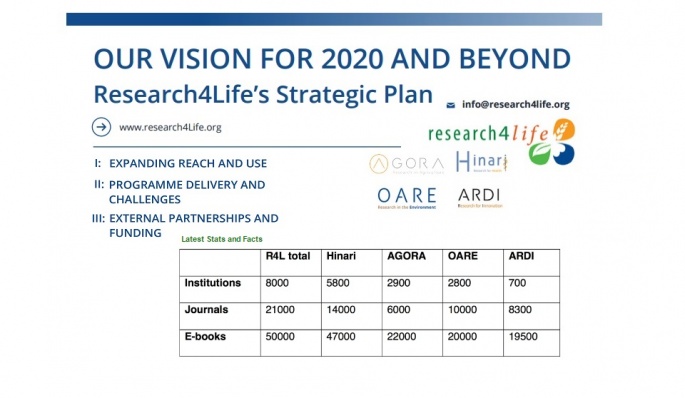Research4Life’s Strategic Plan: access, training and outreach efforts


A new Research4Life’s Strategic Plan “Our Vision for 2020 and Beyond” gives an overview of the context of the Research4Life and current structure of its partnership and outlines the goals that aim to expand the outreach Research4Life programs.
______________________________________________________________________________________________________________
“If you want to go fast, go alone. If you want to go far, go together”, - an African proverb.
A new Research4Life’s Strategic Plan: “Our Vision for 2020 and Beyond” was presented during the last Research4Life (R4L) Annual General Partners Meeting held in New York City. The Plan presents the emerging strategic issues and the priorities of the R4L for the next five years and beyond.
The R4L includes four programmes supported by AGORA, OARE, ARDI, and HINARI research portals.
# Each programme is organically embedded in its sponsoring UN entity, and FAO, UNEP, WHO, and WIPO each have a strong mandate from their member states to ensure equitable access to information resources (R4L Strategic Plan).
# Other R4L programmes may be adopted in the future as thematic areas with appropriate partnership support emerge (R4L Strategic Plan).
The R4L’s goal is to maximize the chances of the United Nations Sustainable Development Goals (SDGs) being realized, in particularly those related to health, education, nutrition, clean water and sanitation, affordable and clean energy, climate action, life on land and below water.
The pioneering work of the R4L - in partnership with hundreds of leading scientific publishers - is focused on providing (free or low-cost) access to scientific information in lower income countries, thus helping researchers in educational, research, and policy institutions participate fully in the global scientific community.
# There are no formal or contractual relationships between any of the groups of partners involved in Research4Life. Governance is as simple and as efficiently structured as possible, with progress monitored and future developments agreed collegially at partner meetings (R4L Strategic Plan).
The R4L aims also at supporting capacity development by engaging target groups in training, and by elaborating specific training guidance and tools as an important addition to R4L’s package of technical systems and services, communications and outreach efforts, and other activities and measures.
# Up to 69, 000 journals, books and databases are available through the four Research4Life Programmes (R4L Strategic Plan).
After introducing the R4L context and presenting the four R4L programs, the R4L Strategic Plan clarifies issues regarding eligibility for access to R4L infrastructure (free access - to institutions in group A countries and paying a small fee - to group B countries).
# The publisher partners have agreed that all fees collected in Group B countries, areas and territories will be remitted back to the Research4Life partnership for use in core support activities such as training, outreach and infrastructure expenses (R4L Strategic Plan).
Afterwards the R4L Strategic plan explains the benefits for researchers, academics, students, practitioners, government officials and policy makers by using AGORA, OARE, ARDI, and HINARI infrastructures, which – although being primary concerned with opening research to the low income countries – are not limited by geographic boundaries.
# Currently more than 5,700 institutions have registered for HINARI access, more than 2,800 for AGORA access, more than 2,800 for OARE access, and some 700 institutions for the newest programme ARDI (R4L Strategic Plan).
# Making a Difference highlights the benefits for researchers and practitioners accessing R4L.
Access to the most recent research information via R4L infrastructure platforms is benefiting the health, well-being, and economic and social development of communities in the developing world, as well as contributing to greater environmental health and awareness. Continuous feedback from partners, in its turn, guides the further R4L strategic vision.
# 78% of respondents state that access to research information is ”extremely important” to their work (R4L Strategic Plan).
After having highlighted challenges (grouped into three major areas) facing R4L that are:
- training and outreach;
- technical infrastructure;
- structure and governance;
the R4L Strategic Plan provides recommendations (in terms of long-term goals) on how to:
- increase the visibility of the R4L programmes;
- improve the technical infrastructure;
- better formalize the R4L structure and improve the R4L governance,
that would also likely lead to improved usage and impose more focus on R4L’s activities.
# While the R4L programmes offer unprecedented access to some of the world’s foremost scientific journals, the effective promotion, delivery and use of these programmes is subject to various risks and challenges, which are identified together with possible mitigation measures (R4L Strategic Plan).
Strategic R4L Plan in a Nutshell:
OBJECTIVE I: EXPANDING REACH AND USE |
|
| Goal A: Widespread awareness and use of R4L and its programmes amongst all stakeholders by effective marketing and publicity. |
| Goal B: Trusted education services that enhance information use in higher education and research settings. |
| Goal C: Measurement of usage and impact of the R4L programmes. |
OBJECTIVE II: PROGRAMME DELIVERY AND CHALLENGES |
|
| Goal D: Seamless, uninterrupted access to discoverable collections of research information through leveraging technological innovations. |
| Goal E: Efficient, focused governance that fosters and leverages commitment and engagement from the core partner community. |
OBJECTIVE III: EXTERNAL PARTNERSHIPS AND FUNDING |
|
| Goal F: Beneficial partnerships with organizations having shared interests. |
| Goal G: Fundraising and Financing. |
Read on to find out more about the R4L Strategic Plan.
Interested in getting more involved or telling the R4L story from your own organization? Contact R4L at [email protected]
Related contents:
- Focus on AGORA: following growth trends in usage and contents
- Research4Life is now part of Oxfam’s Digital Searching and Access Guideline
- Research4Life chooses PortSys’ Total Access Control to Ensure Critical Access and Authentification
- Unsung Heroes (the contribution that librarians have made to facilitating and promoting R4L programmes)

